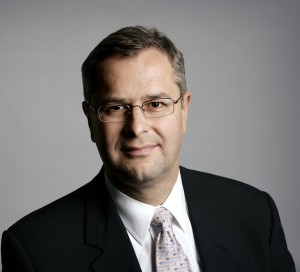Feature, Freight News, Sea
Quality will cost, says Maersk Line
[ March 6, 2012 // Chris ]Shipping lines are losing their shirts and shippers must expect to pay more if they are to enjoy quality services in the future, was as gist of the message from Maersk Line’s new boss on 5 March. Chief executive officer , in his first major announcement to the press since his appointment in January, pointed out that Maersk – probably one of the sector’s better financial performers – had generated shareholder value only once in each of the past seven years, in 2010. Average return on investment over that period was only 2% a year – roughly the same as putting your money into government bonds, he said.
Unable to fund the new ships and other massive new investments needed to stay in business, the lines had had to rely on outside cash, “not a healthy situation” as Skou put it. And with bank finance now scarce to non-existent, it was clearly high time for a rethink of how the industry went about its business, he said.
“If lines had bought new ships only when they could afford them, it would be a much more healthy industry,” he said.
But with the days of (relatively) cheap bank finance at an end, there were signs that the industry is having a rethink. Maersk has been one of the first to throw its hat into the ring, with the decision not to pursue options for a further ten Triple E class containerships. Maersk had also entered an agreement with CMA CGM which would take an estimated 9.5% capacity out of the Asia/Mediterranean trade.
Maersk itself has of course been busy pushing up its own market share in the past year. Globally, it reached 15.5% of the market in the last quarter of 2011 and its share of the Asia-Europe trade pushed up to an all-time high of 19.4% – rather better than the 17.8% it achieved in 2006 just after it took over P&ONedlloyd.
This year, would be different, though. “We will focus on profitability and less on market share,” Skou explained.
He went to say that Maersk would limit itself to an additional 3% more capacity in 2012, but if that failed to have the desired effect or if market was less than expected, there was the scope to reduce capacity by a further 9% by returning chartered tonnage. “In addition, we will slow steam more than we planned to do,” though this would be more noticeable on the Transpacific than the Asia-Europe trades.
Maersk would however seek to defends its 15.5% existing market share, promoting itself as a quality operator with an 87.5% on-time record and the time-guaranteed Daily Maersk Asia to Europe service concept introduced in the third quarter of 2011. Maersk would wait until the Daily Maersk service had been in place for a full year before deciding whether to extend the concept to other trade lanes.
Tags: cma ggm, Logistics, Maersk, Shipping, Søren Skou












